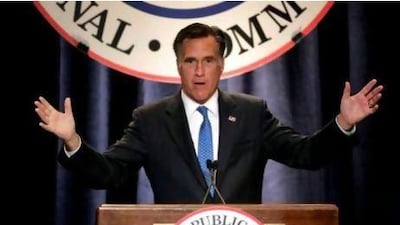WASHINGTON // After a bruising presidential primary campaign, the Republican Party may be too divided and its coffers too in need of contributors to mount a serious challenge to Barack Obama in the autumn election, analysts say.
For now, Mr Obama holds a distinct advantage in the money race over the likely Republican nominee, Mitt Romney, the former governor of Massachusetts.
With no challenge for the Democratic Party's nomination, Mr Obama has been able to sit back and watch as Mr Romney fought hard and spent a fortune to outlast his challengers in his party.
Two remain but Newt Gingrich, the former leader of House of Representatives, is expected to officially quit this week.
As a result, Mr Obama is embarking on what is set to become the most expensive US presidential campaign in history, with a war chest that by the end of March stood at US$104 million (Dh382m).
By comparison, just $10m was left with Romney's campaign after a torrid primary race.
With six months still to go, this will change. Republican strategists are not too concerned about fund-raising, at least for the pro-Romney super Political Action Committees (Pacs), such as the American Crossroads and Restore Our Future, said Bryon Allen, a Washington-based Republican pollster with Wilson Perkins Allen Opinion Research.
Super-Pacs are ostensibly unaffiliated political action committees that can spend unlimited sums promoting any candidate or issue they want.
"The good news for Romney is that he has access to a lot of fund-raising and you have a lot of major Republican donors who will put big money into these super-Pacs," said Mr Allen. "The thing that's going to be more of a challenge is the small dollar fund-raising, the guy who comes in and writes a $50 cheque."
Small money donors drum up enthusiasm. It is they, Mr Allen said, who go out and tell five friends to vote. It is a group the Obama campaign is aggressively targeting. On Saturday, the president's campaign promised those who give $3 or more the chance to attend an all-expenses paid fund-raising dinner in Los Angeles with Mr Obama at the home of George Clooney.
Republicans have been keen to downplay the lack of enthusiasm among the party base for Mr Romney and paint November's election as a crucial one for America, especially its economic future.
Jeffrey Weiss, a Washington-based Republican strategist, believes that on election day, it will be all about the economy.
"I hate to boil it down to gas prices but [the economy] just affects everything," he said.
But although the party may coalesce behind Mr Romney in November, it has made a dramatic lurch to the right in the past years.
Mr Romney's consecutive presidential campaigns have shifted as a result. In 2008, he ran as the conservative alternative to John McCain, the veteran senator and the choice of the party's leadership.
But during this campaign, Mr Romney was attacked repeatedly for his "moderate" positions on abortion and health care.
He spent millions to counter this image and paint himself as a conservative. He may now have to spend millions more to re-position himself to appeal to independent voters. Such a "brutal" campaign will have made Mr Romney a better candidate, able to "parry attacks", Mr Weiss suggested.
That does not hide party divisions, however.
"There's almost a class split within the Republican Party, between the wealthier Republican leadership and the working-class Republican base," said Mr Allen.
The right-leaning, values-based attitudes - illustrated by the rise of the Tea Party with its opposition to abortion, gay rights and government "interference" - are sharply polarising in a general election.
The Republican establishment prefers a candidate that will play down those issues and run on a platform of fiscal responsibility and foreign policy, which is where Mr Romney has now begun pitching himself.
November's general election could therefore be crucial to the future direction of the Republican Party. Win congress and the presidency and the rightward trend looks set to continue. Lose both or either and serious questions will be asked not just about the party's leadership and its preferred candidate, but also the Tea Party philosophy.
"The story the Republicans were telling in 2010 - limited government, constitutionalism, the Tea Party message - if that is going to become the long-term platform of the party, we need to win more than one election in row," said Mr Allen.
Failing that, he said, and even though Mr Romney is not the candidate of the Tea Party, losing in November could further divide and weaken the party.

